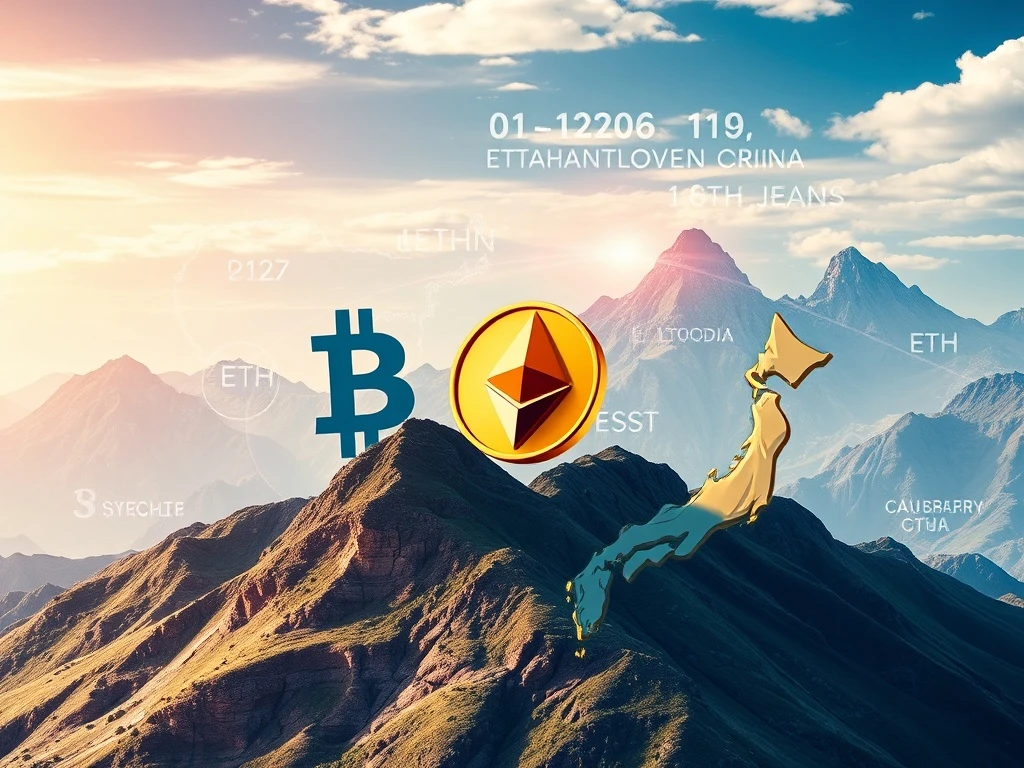Crypto Market Surge: Crucial US-China Relations Ignite Optimism, Japan Eyes Bitcoin Holdings

The cryptocurrency market experienced a notable upward trend today. This `Crypto Market Surge` reflects significant global developments. Key geopolitical shifts and evolving regulatory landscapes are shaping the digital asset space. Investors are closely watching these critical events. Understanding these daily trends helps navigate the dynamic crypto ecosystem.
US-China Relations Spark a Crypto Market Surge
United States President Donald Trump recently confirmed a significant meeting. He will meet with China’s President Xi Jinping. This summit will occur at the Asia-Pacific Economic Cooperation (APEC) event in Seoul, South Korea, on October 31. This announcement marks a reversal from Trump’s earlier stance. He previously indicated “no reason” to attend the meeting. However, his current comments signal a more positive outlook. Trump stated, “We’re going to meet in a couple of weeks… I think we’re gonna be fine with China, but we have to have a fair deal. It’s going to be fair.”
The crypto markets reacted immediately and positively to this news. Geopolitical and trade tensions often impact investor sentiment. Therefore, any development easing these tensions typically boosts assets perceived as riskier. Cryptocurrencies frequently fall into this category. Consequently, the prospect of improved `US China Relations Crypto` provided a strong tailwind. This positive sentiment fueled a notable `Crypto Market Surge` on Sunday. The market rallied significantly, as shown by various trading indicators. Easing trade tensions between the US and China often translates into increased investor confidence globally.
Japan Eyes Significant Japan Bitcoin Holdings for Banks
Japan’s Financial Services Agency (FSA) is actively considering a major policy shift. The agency is reportedly preparing to review regulations. These reforms could allow Japanese banks to acquire and hold cryptocurrencies. Bitcoin, in particular, is a key focus for investment purposes. This move represents a substantial departure from current guidelines. Previously, supervisory rules, revised in 2020, effectively prohibited banks from holding crypto assets. These restrictions were primarily due to perceived volatility risks.
A recent report from Livedoor News highlighted this potential change. According to the report, the FSA plans to discuss this reform. An upcoming meeting of the Financial Services Council will address the matter. This council serves as an advisory body to the Prime Minister. The initiative aims to integrate crypto asset management more closely with traditional financial products. This includes assets like stocks and government bonds. Regulators will also explore a robust framework. This framework will manage crypto-related risks effectively. Sharp price swings, for example, could significantly impact a bank’s financial health. If approved, the FSA will likely impose strict capital and risk-management requirements. These measures would precede any permission for banks to hold digital assets. Such a move could significantly enhance institutional `Japan Bitcoin Holdings` and adoption.
Tornado Cash Developer Warns of DeFi Legal Risks
Roman Storm, a developer behind Tornado Cash, issued a stern warning. He cautioned open-source software developers about potential legal repercussions. His warning specifically targets those working on decentralized finance (DeFi) protocols. Storm highlighted the risk of retroactive prosecution by the United States Department of Justice (DOJ). He posed a critical question to DeFi developers in a recent X post: “How can you be so sure you won’t be charged by the DOJ as a money service business (MSB) for building a non-custodial protocol?”
Storm’s ongoing case is central to this concern. He continued, “If the Southern District of New York (SDNY) can charge a dev for building a non-custodial protocol, who is safe? My case is still ongoing.” This statement underscores the serious `DeFi Legal Risks` developers face. The verdict in the Roman Storm case holds profound legal implications. It directly impacts open-source software development across the United States. Furthermore, it could establish a dangerous legal precedent. Currently, developers often lack explicit protection from such prosecution. The `Tornado Cash Developer` situation highlights the urgent need for regulatory clarity in the DeFi space.
Navigating DeFi Legal Risks and Open-Source Innovation
The legal challenges faced by the `Tornado Cash Developer` are creating ripples throughout the decentralized finance sector. Developers of non-custodial protocols must consider the implications. These protocols are designed to operate without holding user funds directly. However, the DOJ’s stance suggests a broader interpretation of liability. This could classify certain protocols, or their developers, as money service businesses. Such a classification would impose stringent regulatory requirements. Compliance would become a significant burden for many projects.
Moreover, this situation could stifle innovation in open-source development. Developers might become hesitant to contribute to privacy-enhancing tools. They could fear potential legal actions. Consequently, the future of privacy protocols and other groundbreaking DeFi applications faces uncertainty. Clearer guidelines are essential for fostering a secure and innovative environment. Without them, `DeFi Legal Risks` will continue to loom large over the industry. The outcome of Storm’s case will undoubtedly shape the landscape for developers and users alike.
Today’s crypto landscape is shaped by diverse forces. From renewed geopolitical optimism driving a `Crypto Market Surge` to Japan’s progressive stance on `Japan Bitcoin Holdings`, the industry is evolving rapidly. However, the legal battles facing individuals like the `Tornado Cash Developer` remind us of the persistent `DeFi Legal Risks`. These events collectively underscore the complex interplay between technology, regulation, and global economics in the digital asset world. Staying informed on these critical developments remains paramount for all market participants.










